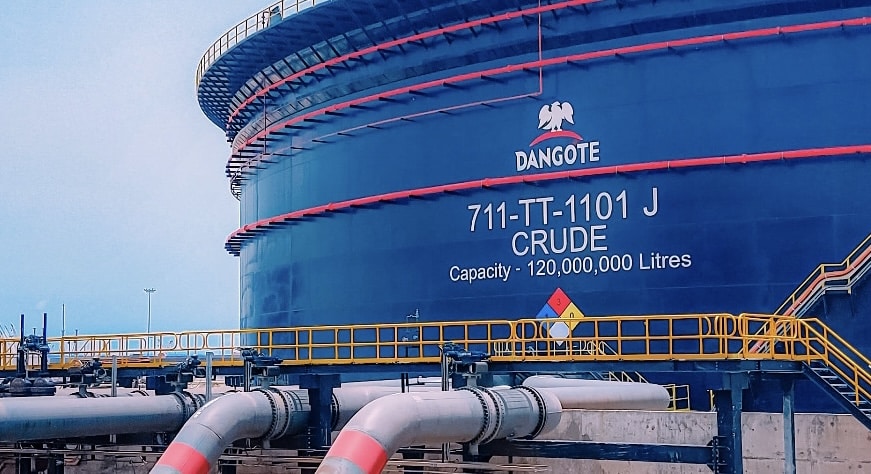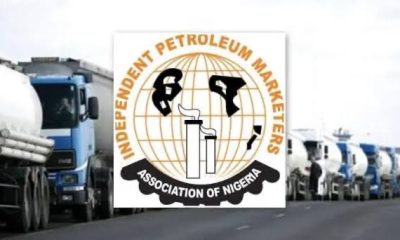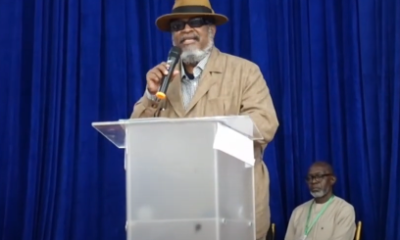Business
Nigeria and the Dangote Refinery Conundrum
Published
2 years agoon
By
Marcel Okeke
For several years now, especially since May 2023, when it was commissioned by (then) President Muhammadu Buhari, the Dangote Refinery, located in Lekki, Lagos, has remained Nigeria’s only hope for a substantial local supply of petrol (Premium Motor Spirit, PMS). This hope became even more desperate on May 29, 2023, when President Bola Ahmed Tinubu, in his inaugural address, announced fuel subsidy removal which was anchored on almost 100 per cent imported PMS.
As a sequel to the subsidy removal and kindred economic policies of the Tinubu administration, prices of goods and services in the country hit the rooftop, driving the inflation rate to unprecedented levels. From slightly over 22 per cent in May 2023, the inflation rate (measured by the Consumer Price Index, CPI) has skyrocketed to 34.20 per cent in June 2024. PMS whose price per liter rose from below N200 in May 2023, to above N700 soon after the subsidy removal, has remained scarce, with the price now ranging between N800 and N1000 per liter in various parts of the country. Fuel scarcity has remained unabated!
In the face of all this, with the economy practically pushed into the doldrums, the hope of PMS from the Dangote Refinery has come to appear forlorn; or lost. Since the commissioning of the facility in May 2023, almost every month in the past year has been proposed/promised as the time the ‘essential commodity’ would start gushing out from taps at the refinery. But rather than the hope being realized, PMS importation has remained the order of the day, with so much scarce foreign exchange (FX) being dissipated by the importers.
On the other hand, during the past year, the Dangote Refinery itself seems to have been unwittingly enmeshed in twists and turns beyond its control. The critical raw material for the Refinery, namely, crude oil, could no longer be sourced from within Nigeria. The reputed largest producer/exporter of crude oil in Africa, Nigeria, suddenly found itself incapable of supplying crude oil to the local refinery. This bizarre situation got so bad that the management of Dangote Refinery had to accuse the multinationals (international oil companies, IOCs) in the country of ‘organized sabotage.’
Specifically, Devakumar Edwin, Vice President of oil and gas, at Dangote Industries Limited (DIL) reportedly accused the IOCs in Nigeria of “doing everything to frustrate the survival of Dangote Oil Refinery and Petrochemicals.” Edwin said the IOCs were deliberately frustrating the refinery’s efforts to buy local crude by jerking up crude oil prices above the market price, thereby forcing it (the refinery) to import crude from countries as far as the United States, with attendant huge costs.
Also Read: Alleged Sabotage on Domestic Crude Oil Supplies: What’s Dangote Refinery Up To?
In addition to this, Edwin also lamented the activity of the Nigerian Midstream and Downstream Petroleum Regulatory Authority (NMDPRA), which he accused of “granting licenses indiscriminately to marketers to import dirty refined products into the country.” He further lamented that “the Federal Government issued 25 licenses to build refineries and we are the only one that delivered on the promise,” saying “In effect, we deserve every support from the Government.”
The DIL chief said: “The IOCs are keen on exporting the raw materials (crude oil) to their home countries, creating employment and wealth for their countries, adding to their GDP, and dumping the expensive refined products into Nigeria, thus making us depend on imported products.” He regretted this scenario, saying that “unfortunately, Nigeria also plays into the hands of the IOCs by continuing to issue import licenses at the expense of our economy.”
Surprisingly, and despite these lamentations and serious allegations by the DIL chief, Dangote Refinery had to resort to importing crude oil from very far-flung places like the US and Brazil. Specifically, early in 2024, the 650,000 barrels per day refinery took delivery of about 10 million barrels of West Texas Intermediate (WTI) crude from the US “to offset unreliable domestic supply.” The Refinery has also issued a tender for an additional 11 million barrels of US crude oil over the next six months. This new tender, closing on July 21, aims to procure two million barrels per month of WTI Midland crude for the refinery, reputed to be the world’s largest single-train facility, for the next six months, starting from August.
In a tender reported by Bloomberg, Dangote Refinery purchased five million barrels of WTI Midland crude for delivery in the coming months of August and September. Additionally, the company initiated a tender process to acquire an additional six million barrels of US crude for October. Bloomberg has also reported that the Refinery is set to import a cargo of Brazilian crude, to “add to the large number of overseas barrels of crude feedstock that the Nigerian firm imports.”
This importation of crude oil by the Dangote Refinery is a vivid pointer to the beleaguered state of the Nigerian hydrocarbon industry. It looks ridiculous, even incredulous, that with Nigeria’s ranking among African crude producers and the Organization of Petroleum Exporting Countries (OPEC), it is yet unable to meet the crude input needs of just a few local refineries in the country. And Dangote Refinery is the only one of notable capacity; others are small modular refineries.
Dangote Refinery resorting to importing crude from abroad is portentous for Nigeria. First, it puts a huge question mark on the country’s long-hyped crude oil production/exporting capacity, which gave it a high ranking in the hydrocarbon business world.
Secondly, the lack of capacity to meet the crude input needs of local refineries exposes the precarious state of the oil sector in Nigeria. In recent times, the oil exploration and production (E & P) business has been buffeted by a myriad of challenges, including the menace of massive oil theft.
Also Read: Dangote accuses IOCs of sabotaging refinery’s efforts to purchase crude
Militancy and youth restiveness, coupled with outright sabotage and assets vandalism, have adversely affected E & P over the years in the oil-producing Niger Delta region of the country. Aging equipment and lack of fresh capital investments have also been the lot of the industry. Also, the long delay in enacting the Petroleum Industry Act (PIA) made most operators either withhold or divert their investments elsewhere. All these have led to very low production and export volume of crude from Nigeria.
In point of fact, for several years now, Nigeria has been producing and exporting crude far below its allocated OPEC quota. While the oil cartel expects Nigeria to bring about two million barrels per day of crude to the global market, the country has hardly been able to produce/supply anything more than 1.3 million barrels per day. The recent exit of most of the IOCs from Nigeria (especially from onshore operations) has also caused some hiccups in the E & P arm of the oil and gas business.
The upshot of all these, perhaps, is manifesting in the dire situation of Dangote Refinery having to depend on crude oil importation for its operations. What may not also have been obvious is the fact that other much smaller refineries (modular) have also not had reliable/adequate crude supply from within Nigeria. Indeed, it has become quite revealing that much of the crude oil produced in Nigeria has been mortgaged in the past couple of years as ‘collateral’ for Federal Government loans.
Even as the Dangote Refinery’s embarrassing situation of importing crude oil from abroad became public knowledge just recently, the Nigeria National Petroleum Company (NNPC) Limited was reportedly processing another US$2.5 billion oil-backed credit facility for funding its operations. This implies that a large chunk of current oil production has been ‘given out’ to secure loans from multilateral financial institutions.
The import of all these is that Dangote Refinery’s crude oil importation will drive up its cost of operations, and this will ultimately be factored into its pricing of PMS from its plants. Worthy of note also is the fact that the Refinery is located in a free-trade zone, which automatically empowers it (if it chooses) to stick to exporting its products, rather than serving the local market.
The Dangote Refinery is first and foremost a business; and might not choose to serve the Nigerian market with cheap PMS at huge losses. Not after going through the harrowing experience of crude oil importation and scaling willful but insidious hurdles by government and non-government agents in Nigeria. So, cheap fuel from Dangote Refinery might end up a mere wishful thinking. Let’s wait and see!
- The author, Okeke, a National Daily Columnist is a practising Economist, Business Strategist, Sustainability expert and ex-Chief Economist of Zenith Bank Plc, lives in Lekki, Lagos. He can be reached via: [email protected] (08033075697 SMS only)
You may like


Abiodun commends Dangote for high-net-worth investments in Ogun


IPMAN-Dangote partnership drives down PMS prices


Nduka Obaigbena calls for the revitalization of Nigeria’s refineries to combat market monopoly


Ghana proposes to import petroleum from Dangote Refinery


Nigerian Economy and Diminishing Foreign Direct Investment


Economic Stabilization Bill: Necessary Stimulus for Nigerian Economy
Trending

 Entertainment5 days ago
Entertainment5 days agoSimi addresses resurfaced 2012 tweets amid online backlash

 Comments and Issues1 week ago
Comments and Issues1 week agoNigeria’s Declining Oil Output and Soaring Foreign Portfolio Investment Inflow

 Comments and Issues1 week ago
Comments and Issues1 week agoEx-prince Andrew’s arrest, lessons for Nigeria

 Health7 days ago
Health7 days agoSCFN, LUTH introduce bone marrow transplants as curative treatment for sickle cell

 Comments and Issues1 week ago
Comments and Issues1 week agoThe Seyi Tinubu’s jellof rice, loaves of bread

 Health3 days ago
Health3 days agoDeclassified CIA memo explored concealing mind-control drugs in vaccines

 Football7 days ago
Football7 days agoHarry Kane nets brace as Bayern edge Frankfurt 3–2 to go nine points clear

 Football7 days ago
Football7 days agoLate Flemming header stuns Chelsea as Burnley snatch 1–1 draw at Stamford Bridge

